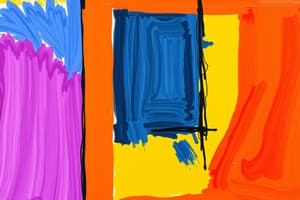Podcast
Questions and Answers
Which brain region is primarily responsible for reasoning and problem-solving during drawing?
Which brain region is primarily responsible for reasoning and problem-solving during drawing?
- Parietal Lobe
- Cerebellum
- Occipital Lobe
- Frontal Lobe (correct)
What is the significance of Paleolithic art in the context of communication?
What is the significance of Paleolithic art in the context of communication?
- It is the oldest form of written communication.
- It was primarily created for decorative purposes.
- It predates written communication and depicts abstract concepts. (correct)
- It represents the beginning of scientific study.
What distinguishes drawing from painting in Western terminology?
What distinguishes drawing from painting in Western terminology?
- The emotions expressed in the artwork
- The tools used for application
- The types of colors used
- The media typically associated with each task (correct)
Which of the following statements is true about Neolithic drawings?
Which of the following statements is true about Neolithic drawings?
Which role does the temporal lobe play when we draw?
Which role does the temporal lobe play when we draw?
What was the primary material used by 12th-century monks for illustrated manuscripts?
What was the primary material used by 12th-century monks for illustrated manuscripts?
Which of the following describes the transition of drawing from traditional to modern methods?
Which of the following describes the transition of drawing from traditional to modern methods?
What is a common use of drawing in the field of science?
What is a common use of drawing in the field of science?
What is the primary focus of technical drawing?
What is the primary focus of technical drawing?
Which shading technique involves creating tonal effects using closely spaced parallel lines?
Which shading technique involves creating tonal effects using closely spaced parallel lines?
How does pointilism differ from stippling in drawing methodologies?
How does pointilism differ from stippling in drawing methodologies?
Which category of drawing is characterized by unconscious and unfocused representation?
Which category of drawing is characterized by unconscious and unfocused representation?
Which term refers to an area on the ground that shows where light is coming from?
Which term refers to an area on the ground that shows where light is coming from?
Flashcards are hidden until you start studying
Study Notes
Drawing History and Development
- Drawing activates multiple brain regions: frontal lobe (reasoning, planning, movement, emotions, problem-solving), parietal lobe (movement, orientation, recognition, perception of stimuli), occipital lobe (visual processing), temporal lobe (perception, memory), and cerebellum (movement).
- One of the oldest forms of human expression in the arts.
- Drawing involves making lines, areas of tone, and using a plane surface.
Drawing in Communication
- One of the oldest forms of human expression, existing before written communication.
- Paleolithic art is the oldest form of prehistoric art, with pictograms depicting objects and abstract concepts.
- Neolithic sketches and paintings were eventually stylized and simplified into symbol systems (proto-writing) and later into early writing systems.
Drawing in Manuscripts
- Before paper was widely available, European monks in the 12th century used intricate drawings to create illustrated, illuminated manuscripts on vellum and parchment.
Drawing in Science
- Drawing diagrams of observations is essential for scientific study.
- In 1609, Galileo Galilei used telescopic drawings to explain the changing phases of Venus and sunspots.
Drawing as Artistic Expression
- Drawing allows for expressing creativity.
Distinctions between Drawing and Painting
- Traditional drawings are monochrome, whereas modern colored-pencil drawings can blur the lines between drawing and painting.
- Drawing differs from painting in Western terminology, even though similar media are often used.
- Dry media, traditionally associated with drawing (e.g., chalk), are also used in pastel paintings.
- Drawing can be done with liquid media, applied with brushes or pens.
Timeline of Drawing Development
- Paleolithic: Pictograms depicting objects and abstract concepts.
- Neolithic: Symbol systems (proto-writing) that evolved into writing.
Drawing
- Often exploratory, focusing on observations, problem-solving, and composition.
Categories of Drawing
- Figure Drawing: Depicting the human form in various shapes and postures.
- Cartooning: Humorous depictions often with captions, symbolic and satirical representations.
- Doodling: Unconscious or unfocused drawings.
- Freehand Drawing: Drawing without instruments.
- Technical Drawing: Detailed and precise diagrams or plans conveying information about object functions or construction.
Drawing Methodologies
- Line Drawing: Images consisting of straight or curved lines against a background, without shading or gradients.
- Stippling: Creates a pattern with small dots suggesting varying degrees of solidity or shading.
- Pointilism: Painting technique using small, distinct dots of color to form an image.
- Shading Techniques:
- Hatching: Creating tonal or shading effects using closely spaced parallel lines.
- Cross Hatching: Using lines placed at an angle to each other.
- Contour Hatching: Using lines that follow the contours of the subject.
- Stippling: Creating a pattern with small dots suggesting varying degrees of solidity or shading.
- Circulism/Scumbling: Drawing very tiny overlapping and intertwining circles.
- Smudging/Blending: Rubbing or swiping graphite to create soft tonal values.
5 Principles of Shading
- Highlight: Shows where light hits an object.
- Shade Area: The place where light does not hit the surface.
- Shadow: An area on the ground showing where light is coming from.
Studying That Suits You
Use AI to generate personalized quizzes and flashcards to suit your learning preferences.




